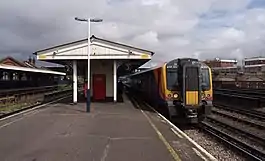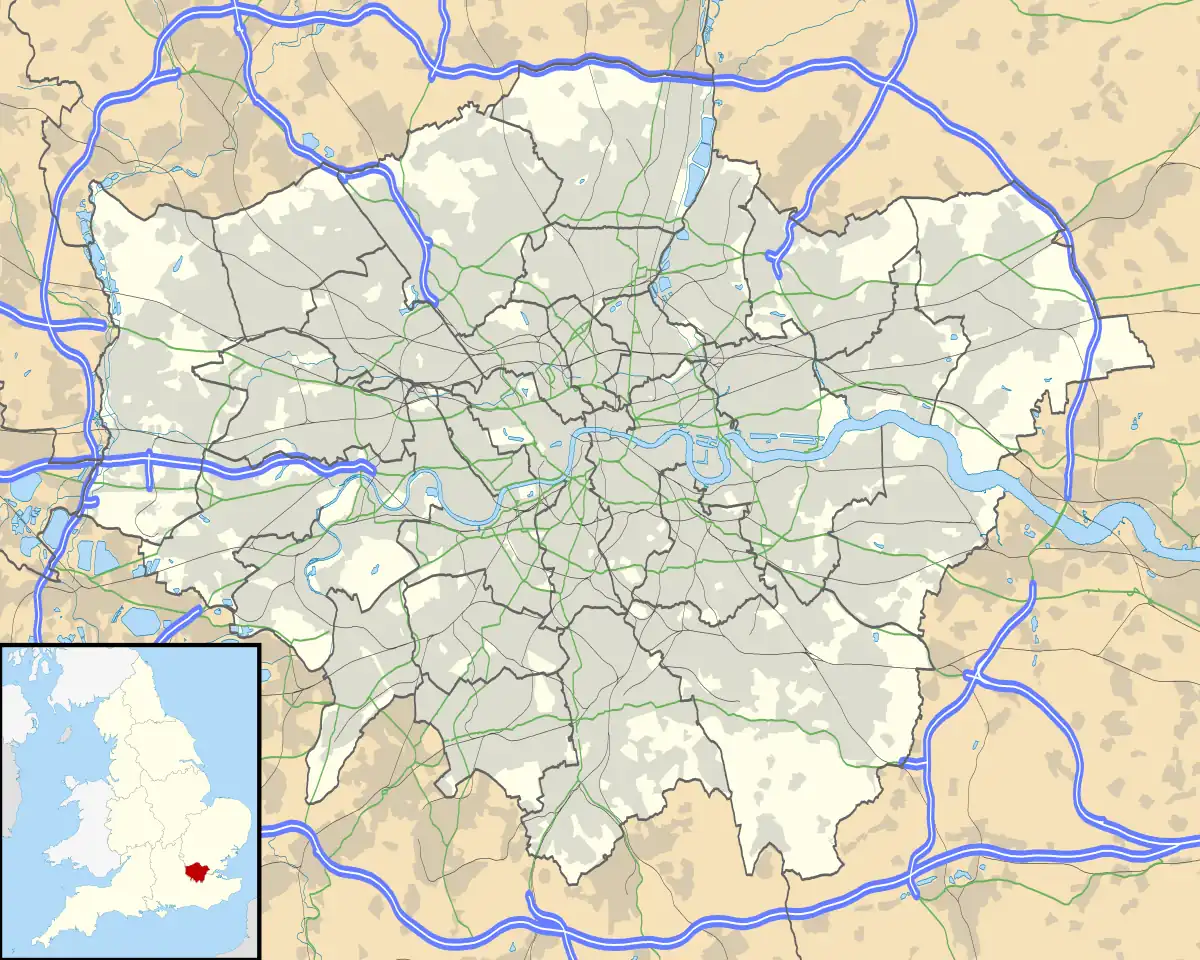| Queenstown Road | |
|---|---|
 | |
 Queenstown Road Location of Queenstown Road in Greater London | |
| Location | Battersea |
| Local authority | London Borough of Wandsworth |
| Managed by | South Western Railway |
| Station code | QRB |
| DfT category | F1 |
| Number of platforms | 3 (2 in use) |
| Fare zone | 2 |
| OSI | Battersea Park |
| National Rail annual entry and exit | |
| 2018–19 | |
| 2019–20 | |
| 2020–21 | |
| 2021–22 | |
| 2022–23 | |
| Key dates | |
| 1 November 1877 | Opened as Queen's Road (Battersea) |
| 12 May 1980 | Renamed Queenstown Road (Battersea) |
| Other information | |
| External links | |
| WGS84 | 51°28′29″N 0°08′49″W / 51.4748°N 0.147°W |

Queenstown Road is a railway station in inner south-west London, 2 miles 50 chains (4.2 km) south-west of London Waterloo, between Vauxhall and Clapham Junction. It is a short walk from Battersea Park station and Battersea Park to the west. It has three platforms, two of which are in use by all stopping services related to the Waterloo to Reading Line: its branch services to Weybridge (via Hounslow) and two separate sets of bidirectional Waterloo-to-Waterloo services via Hounslow using the Hounslow Loop and via Kingston using the Kingston Loop. In addition, 50% of maximum peak hour trains serving the Shepperton branch line call at the station.
History
The station was opened on 1 November 1877, by the London and South Western Railway, as Queen's Road (Battersea).[2] The entrance still bears the name Queen's Road, not to be confused with Queens Road Peckham, Walthamstow Queen's Road or Queensway Underground station, which was also originally called Queens Road.
Queen's Road was also the name of the road in which the station is located. Named after Queen Victoria, after the Second World War the street's name was changed to Queenstown Road.[3] The station was renamed Queenstown Road (Battersea), to go with the road, on 12 May 1980.[2] The station's modern entrance and platform signage lacks the "(Battersea)" suffix that appears in timetables and on some maps. The latest "Oyster Rail Services" map produced by Transport for London shows the station as plain "Queenstown Road".[4] On the map produced by the station managers, South Western Railway, the station is called "Queenstown Road".[5]
Services
Queenstown Road is on the early stage of the South West Main Line but with only 2 platforms in use. The off-peak frequency in trains per hour is:
- Northbound:
- 8 to London Waterloo
- Southbound:
- 2 to Weybridge via Hounslow and Staines
- 4 on the Hounslow Loop back to London Waterloo:
- 2 on the Kingston Loop (anti-clockwise) via Richmond and Kingston, back to London Waterloo[lower-alpha 1]
| Preceding station | Following station | |||
|---|---|---|---|---|
| Vauxhall | South Western Railway Kingston and Hounslow loop lines Waterloo to Weybridge via Hounslow Shepperton branch line |
Clapham Junction | ||
Connections
London Buses routes 137, 156, 452 and night route N137 serve the station.[6]
Future
Network Rail plans to reopen Platform 1 at Queenstown Road to permit the segregation of Windsor and Mainline services flows, providing additional capacity on the approach to London Waterloo.[7]
Notes
- ↑ Services coming back from the Kingston Loop (northbound) do not stop at Queenstown Road.
Conversely, clockwise services do not stop at Queenstown Road in the southbound direction but do in the northbound direction.
References
- 1 2 3 4 5 "Estimates of station usage". Rail statistics. Office of Rail Regulation. Please note: Some methodology may vary year on year.
- 1 2 Butt, R.V.J. (1995). The Directory of Railway Stations. Yeovil: Patrick Stephens Ltd. p. 193. ISBN 1-85260-508-1. R508.
- ↑ "Old To New Street Names: 1929-1945". The Hunthouse.
- ↑ "Transport for London". tfl.gov.uk.
- ↑ "Live UK Train Timetables – South West Trains" (PDF). southwesttrains.co.uk. Archived from the original (PDF) on 15 February 2010.
- ↑ "Buses from Battersea Park" (PDF). TfL. 12 November 2022. Retrieved 24 December 2021.
- ↑ "Wessex Route Study Final 2015" (PDF). Network Rail. p. 30. Archived from the original (PDF) on 5 July 2017. Retrieved 15 May 2023.
External links
- Train times and station information for Queenstown Road railway station from National Rail